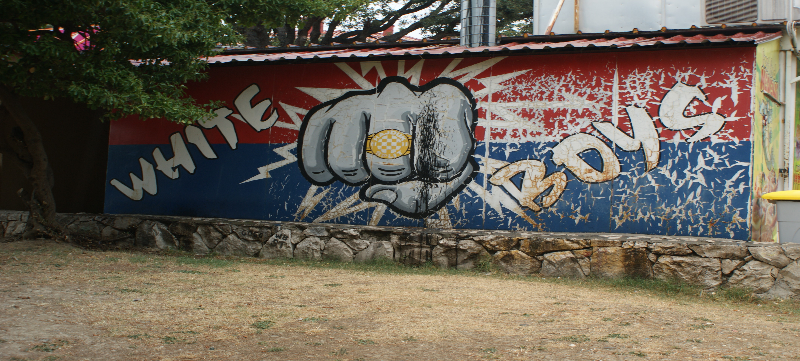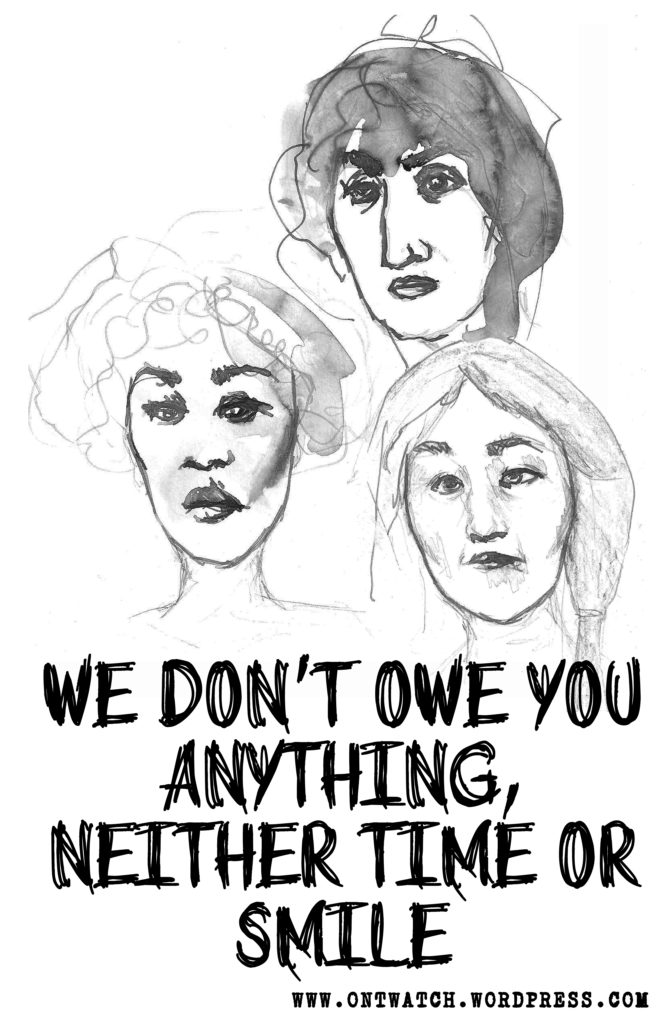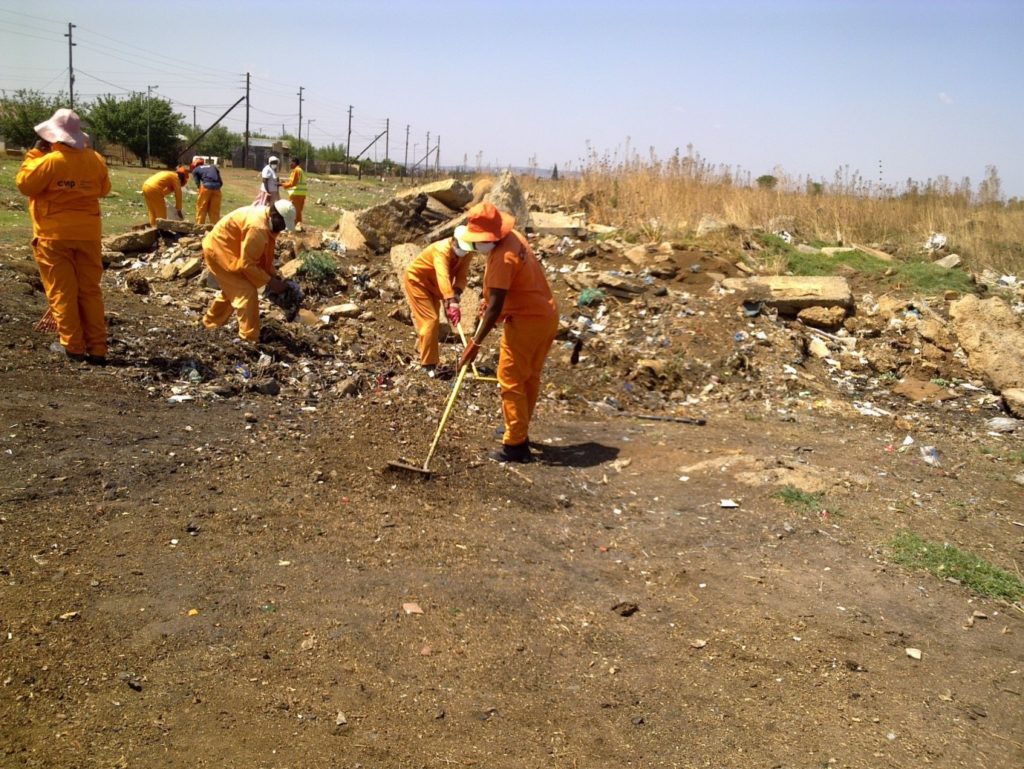Shawn Ray, Croatia, Macedonia, Greece, Turkey, Iran, SSH Blog Correspondent
[Editor’s Note: In Part 1, Shawn shares how she’s “traveled through 71 countries, and surprisingly, have recently found Split, Croatia, to be the most openly racist addition to the new EU. By openly, I mean the inhabitants have not adapted to the niceties of subversive sexual harassment. It is acceptable behavior to yell derogatory comments, to touch and even throw things at female human beings.” These are a few recent examples.]
September 1, 2016 (Croatia)
Excuse me, can I take a picture with you?
Me: Why?
Because I have never seen a Blackie before, and I want to show my friends.
Me: What are your friends’ names?
Sara and Christiana.
Me: Well, I’ll make you a deal. How about we become friends and then you can introduce me to your other friends one day and we can all take pictures together? Because I’m not actually a Blackie. And, I understand why you would think that, because I look like the one’s you’ve seen on TV. But here’s how you can tell the difference, a Blackie would let you take a picture of them, without being a friend of yours. I wont.
What are you?
Me: Well, first, I’m a child of The Creator. Do you believe in God?
Yes, We are Christian.
Me: Well, that’s what I am. A creation, like you. My Ancestry and ethnicity is that of the Moor. I am a Moor.
What is a Moor?
She sits on the bench next to me at the park. with her mother watching intently, hands on hips.
I smile to communicate I have no intention of harming her child, because as I’ve been informed, ‘Blackies’ are generally assumed to be of a violent nature in this region. I can’t help but wander how that started, chicken or egg?
Me: Well, the Moors built the first university in the world in the 7th century and valued wisdom and cleanliness above all other things. My ancestors taught your ancestors how to wash their hands to stop the spread of disease, when they arrived 5 thousand years ago. Betcha never heard that before, Huh.
No.
Me: So, A Moor is a keeper of black magic, not the evil kind on tv, but the kind that makes you want to take a picture with me, because you think there are things I know about the universe, the earth, the water, the air, men (she smiles) … and you sense these things, but can’t see them clearly, and you’re right.
As the first people, my ancestors taught your ancestors many things, but we kept many things for ourselves. And every once in a awhile, traveling around the world, I run into some smart beautiful young woman who can sense the world is changing, and she’s coming into mystery, like you, I think.
But I only share what I know and learn with my friends, just like you & Sara & Christiana. So, I hope we can be friends, what do you think?
Yes, I want to be friends.
Me: Me too.
Okay, so here’s the deal. Do you like to read?
Not really, but I have a reader.
Me: Great, There is a book we can read together, that I’ve read with many of my new friends. You can download it, It’s called “The Isis Papers” by Dr. Frances Cress Welsing. It’ll be easy to read, because you’ve never read anything like this before, trust me.
What is it about?
Me: The difference between a Blackie and a Moor.
You mean slavery?
Me: Not really. More about how we can only see so much standing in one place. This book will let you stand in a different place and see the world through the eyes of someone very different than you. The more places we stand in life, the better we understand each other.
Eventually, you’ll be able to teach your parents and your friends how to tell the difference between a ‘blackie’ and a Moor, like an ambassador or a good friend.
But, I promise it isn’t boring. And some of it will make you angry, or sad, and I still have a lot of questions and I’ve read it so many times.
It’s just a good place for us to start to have a really good honest talk, like the way you’re able to talk to Sara and Christiana, truthfully and openly, like friends do.
You in?
Ok. Wait.
She skips back to her mother says a few words and dives into her backpack as her mother strokes her hair and looks back at me. We smile and wave.
Okay, what is the name?
Me: The Isis Papers ,by Dr. Frances Cress Welsing. After some time, we order her a copy on my account from Amazon. (I have gifted 6 copies to date to begin relevant conversations.)
Me: So, when you get it, you call me and wherever I am in the world, I’ll call you back, and we’ll talk about what were reading together, and before you know it we’ll be good friends. And when we finish reading it, I’ll come back to take you and Christiana and Sara to lunch, and we will dress up and do our hair and makeup and decorate ourselves to feel beautiful and have a girls afternoon. We can pick a new book to read together while I travel, and we’ll take lots of pictures together, as friends Then I can tell my friends about you too, Is it a deal?
I offer her a fist pump, which confuses her, but delights her at the same time as if she’s received the first installment of cool.
Yes. She hugs me. Runs across the park to her mother and I watch her excitedly related our conversation. They both turn back to wave and I raise a black power fist and she does too.
Her mother gestures at my hair and kisses her fingers together in approval. She gives the thumbs up and a wink because she wants me to know she thinks I’m excellent, and she’s right.
___________________________________________________________________________
**This man followed me along the boardwalk from 10:36 when I noticed until I reached a group of officers in the park at 11:49. He walked hurriedly away as I approached the female officer…
“Excuse me, This man has been following me for almost an hour, the man running from us, through the park, there.”
Female Officer: ” Are you sure?”
___________________________________________________________________________
September 2, 2016
Hello, Where are you from?
Why?
Because I have friends with hair like that, from America.
Yes, I’m from America.
What City?
Los Angeles.
Are you a Crip or a blood?
___________________________________________________________________________
September 3, 2016
Oh my god, what is your name?
Why?
Because I have never kissed a Black before. Can I kiss you?
No.
Why not?
**This Young man shouted “Animal” and stood his ground when I returned to take a picture of him. His parents must be so proud. 🙂
___________________________________________________________________________
September 4, 2016
Excuse me, are you a singer?
No.
Come on, I know you are a singer. A Jazz or Blues singer, sing something.
___________________________________________________________________________
September 4, 2016
Can you teach me how to talk Black?
I like the way they talk like that, so tough.
(Puts hands in air to simulate gang signs)
Can you teach me?
The boy to the right: “Hi, you look so good and sexy?
I am very good in bed, I can make you feel really good.
I like the Black. Where are you from?”
___________________________________________________________________________
September 1 – 5, 2016
Can I touch your hair? (18 times)
Can I touch your skin? (5 times)
**Not sure what I was guilty of but it disgusted and angered this women so much, She wasn’t available to comment on her ignorance, when I smiled and said Hello,
Shawn Ray is an avid traveler and freelance writer/photojournalist. Also a TEFL instructor, Shawn has visited over 70 countries and lived for a year or more in several foreign communities. In 2015, Shawn followed the migration of Syrian asylum seekers from Turkey through the Netherlands. A member of GoTravelBroad, (a solo-female travel support and advocacy group) Shawn is focused on creating awareness to end violence against women worldwide, through empowering women to travel without apology.


 I would warn that when a woman discusses mistreatment, asking her to qualify her experience is synonymous with the famous, “what were you wearing?”, and highly problematic. While many of the citizens here would vehemently defend the ‘intention’ of the graffiti wall, some go so far as to accuse me of misunderstanding. At a time when the people of the Balkans are struggling to find a democratic expression and recover from tyranny, it’s surprising that anyone here would admonish a victim of mistreatment, “not to believe your eyes.” Is it possible that the vacuous space required for hostility and oppression to occur, come from the philosophy of justifying, rationalizing and explaining inappropriate behavior? Is it possible that holding people accountable to their intentions and beliefs, while ignoring their behavior and conversation is a critical component in the psychodynamics of privilege?
I would warn that when a woman discusses mistreatment, asking her to qualify her experience is synonymous with the famous, “what were you wearing?”, and highly problematic. While many of the citizens here would vehemently defend the ‘intention’ of the graffiti wall, some go so far as to accuse me of misunderstanding. At a time when the people of the Balkans are struggling to find a democratic expression and recover from tyranny, it’s surprising that anyone here would admonish a victim of mistreatment, “not to believe your eyes.” Is it possible that the vacuous space required for hostility and oppression to occur, come from the philosophy of justifying, rationalizing and explaining inappropriate behavior? Is it possible that holding people accountable to their intentions and beliefs, while ignoring their behavior and conversation is a critical component in the psychodynamics of privilege?

 Today marks the start of Freshers’ Week here in the UK. Over 400,000 undergraduates begin their first week of their first term of their first year at university. A longstanding institution, ‘Freshers’ Week’ – or ‘Welcome Week’, to give it it’s formal name – is fun, flirty and fabulous. A lot of planning goes into making it so and this year, more so than any other, a lot of effort has also gone into ensuring students’ sexual safety.
Today marks the start of Freshers’ Week here in the UK. Over 400,000 undergraduates begin their first week of their first term of their first year at university. A longstanding institution, ‘Freshers’ Week’ – or ‘Welcome Week’, to give it it’s formal name – is fun, flirty and fabulous. A lot of planning goes into making it so and this year, more so than any other, a lot of effort has also gone into ensuring students’ sexual safety.